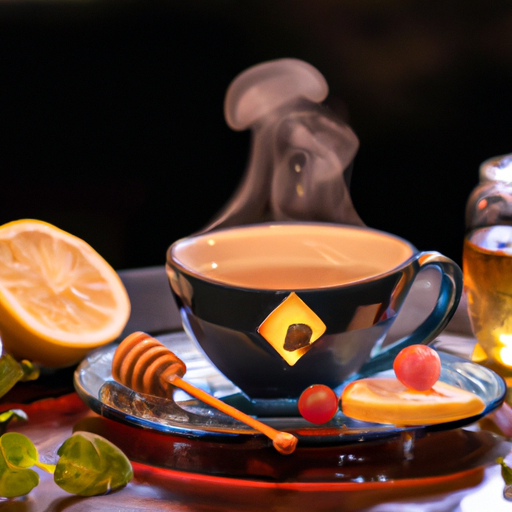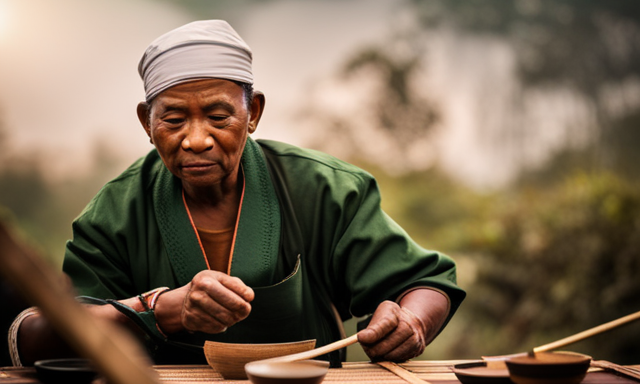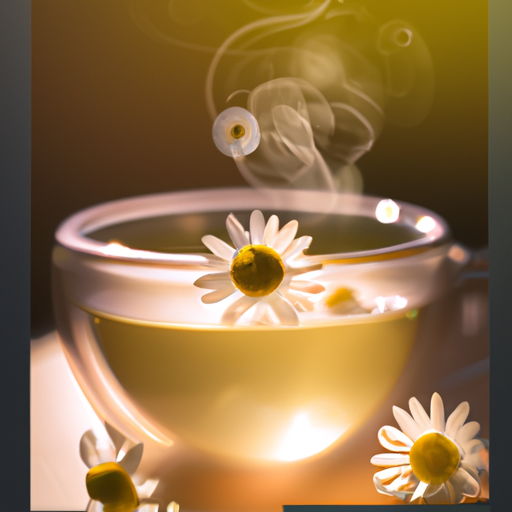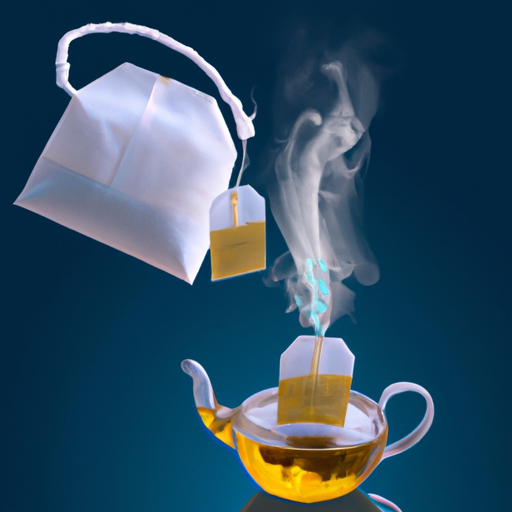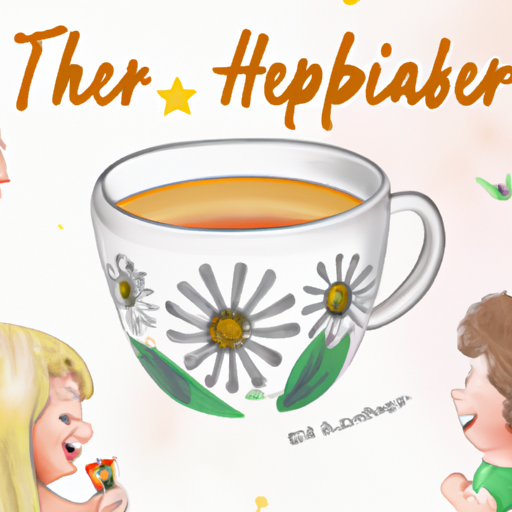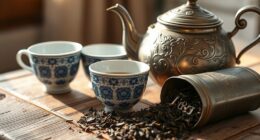As I sat on my cozy porch, a gentle breeze carrying the scent of blooming flowers wafted through the air. Craving a soothing cup of herbal tea, I reached for my favorite blend, only to realize I had run out of my usual sweetener.
Determined to create a delightful and satisfying brew, I embarked on a journey to discover the perfect ingredients to sweeten my herbal tea. Luckily, I stumbled upon a treasure trove of options that would not only enhance the flavor, but also provide a healthy alternative to refined sugar.
From the golden goodness of honey to the subtle sweetness of stevia, there are numerous natural sweeteners that can transform your cup of herbal tea into a delightful treat. Join me as I delve into the world of herbal tea sweeteners, exploring the wonders of agave syrup, maple syrup, fruit juices, cinnamon, and even vanilla extract.
Get ready to elevate your tea-drinking experience with these delectable additions!
Key Takeaways
- Honey is a natural sweetener that enhances flavor, has antibacterial properties, provides an energy boost, and aids digestion.
- Stevia is a zero-calorie sweetener that is 200 times sweeter than sugar, regulates blood sugar levels, and aids in weight management.
- Agave syrup, made from the sap of the agave plant, adds depth to tea, has a lower glycemic index, and contains trace amounts of vitamins and minerals.
- Maple syrup is a nutritious alternative to refined sugar, rich in antioxidants and minerals, has a lower glycemic index, and offers a caramel-like sweetness.
Honey
Add a dollop of honey to your herbal tea to create a warm and comforting sweetness that’ll envelop your taste buds in a blanket of golden goodness.
Not only does honey enhance the flavor of your tea, but it also offers numerous health benefits. Honey’s known for its antibacterial properties, which can help soothe a sore throat or alleviate symptoms of a cold. Additionally, honey’s a natural energy booster and can aid in digestion.
When choosing a honey to sweeten your herbal tea, consider the different types available, such as wildflower, clover, or manuka honey. Each type’s got a unique flavor profile that can complement your tea in different ways.
Now, let’s move on to the next sweetener option: stevia.
Stevia
Mix in some Stevia for a naturally sweet kick to your brew. Stevia is a natural sweetener derived from the leaves of the Stevia rebaudiana plant. It contains zero calories and has a sweetness that’s 200 times stronger than sugar.
Stevia is a great choice for those looking to cut down on their sugar intake without sacrificing taste. It also has several health benefits, such as regulating blood sugar levels and aiding in weight management.
When using Stevia in herbal tea, start with a small amount and adjust to taste. A little goes a long way! Remember, moderation’s key when it comes to sweeteners.
Now, let’s move on to the next option: agave syrup.
Agave syrup
To enhance your brew with a touch of natural sweetness, consider incorporating agave syrup into your preferred infusion. Agave syrup is a popular alternative to traditional sweeteners like sugar and honey. It’s made from the sap of the agave plant and offers a unique flavor profile that adds depth to your herbal tea.
It has a lower glycemic index compared to sugar, making it a great option for those watching their blood sugar levels. Agave syrup also contains trace amounts of vitamins and minerals, including calcium and iron. Its smooth texture blends seamlessly into your tea, providing a balanced and pleasant taste.
Now, let’s move on to explore another sweetening option for your herbal brew: maple syrup.
Maple syrup
If you’re looking for a natural and flavorful option, maple syrup is a great choice to enhance your brew. Not only does it add a touch of sweetness, but it also brings a unique and rich flavor to your herbal tea. Here are four reasons why maple syrup is an excellent alternative sweetener for your beverage:
-
Health benefits: Maple syrup is a more nutritious option compared to refined sugar. It contains antioxidants and minerals like manganese and zinc, which can support a healthy immune system and promote overall well-being.
-
Lower glycemic index: Unlike regular sugar, maple syrup has a lower glycemic index. This means it won’t cause a sudden spike in blood sugar levels, making it a suitable choice for those watching their sugar intake.
-
Distinct flavor profile: Maple syrup adds a delightful touch of caramel-like sweetness to your tea, enhancing its taste and aroma.
-
Versatility: Maple syrup can be easily incorporated into various herbal tea blends, allowing you to experiment and create unique flavor combinations.
With its alternative sweetening properties and health benefits, maple syrup is a fantastic addition to your herbal tea. Moving onto the next section, let’s explore the option of using fruit juices to sweeten your brew.
Fruit juices
Indulge in the natural sweetness of fruit juices to elevate the flavor profile of your brew and discover a delightful depth that will captivate your taste buds. Blending herbal tea with fruit juices is a flavorful twist that opens up a world of possibilities. By exploring unique combinations of herbs and fruit juices in tea, you can create a drink that is both refreshing and full of natural sweetness. Here is a table showcasing some exciting pairings to inspire your next infusion:
| Herbal Tea | Fruit Juice | Flavor Combination |
|---|---|---|
| Chamomile | Orange | Soothing and Citrusy |
| Mint | Watermelon | Cool and Refreshing |
| Lavender | Blueberry | Floral and Berrylicious |
| Ginger | Pineapple | Spicy and Tropical |
Try these combinations or experiment with your own. The addition of fruit juices can transform your herbal tea into a delightful and unique beverage. Now, let’s move on to the next section and explore the wonders of cinnamon.
Cinnamon
Spice up your brew with the warm and comforting aroma of cinnamon, creating a sensory experience that transports you to a cozy fireside. Cinnamon not only adds a delightful flavor to your herbal tea, but it also offers numerous health benefits.
Studies have shown that cinnamon can help regulate blood sugar levels, reduce inflammation, and boost brain function. To enhance the flavor of your tea, consider combining cinnamon with other ingredients such as ginger or nutmeg. The combination of these spices creates a harmonious blend that tantalizes your taste buds.
Additionally, cinnamon pairs well with herbal teas like chamomile or rooibos, creating a soothing and aromatic beverage. As we move on to the next section about vanilla extract, you’ll discover another exciting way to sweeten your herbal tea.
Vanilla extract
Vanilla extract brings a delicate and aromatic sweetness to your brew, creating a rich and indulgent experience that elevates the flavors of your favorite herbal infusion. Not only does it add a touch of sweetness, but it also enhances the overall taste and aroma of your tea.
Apart from its use in tea, vanilla extract is a versatile ingredient that can be used in a variety of recipes. It adds depth and complexity to baked goods, ice creams, and even savory dishes like sauces and marinades.
When it comes to choosing vanilla extract, there are different types available, each with its own unique flavor profile. Madagascar vanilla extract is known for its rich and creamy taste, while Mexican vanilla extract has a slightly spicy and woody flavor. Tahitian vanilla extract, on the other hand, has a floral and fruity aroma.
Experimenting with these different types can add a whole new dimension to your herbal tea. So go ahead, grab your favorite vanilla extract, and enjoy the delightful sweetness it brings to your cup of tea.
Frequently Asked Questions
Can I use artificial sweeteners like aspartame or saccharin to sweeten my herbal tea?
No, it is not recommended to use artificial sweeteners like aspartame or saccharin to sweeten herbal tea. Instead, opt for natural sweeteners such as honey, stevia, or agave syrup, which can enhance the flavor without any potential health concerns.
Is it possible to use regular granulated sugar to sweeten herbal tea, or does it have to be a liquid sweetener?
Using regular granulated sugar to sweeten herbal tea is possible, but liquid sweeteners may dissolve more easily. Honey is a popular choice, adding a touch of natural sweetness and potential health benefits.
Are there any health benefits or drawbacks to using honey as a sweetener in herbal tea?
Honey offers numerous health benefits when used as a sweetener in herbal tea. It contains antioxidants, can soothe a sore throat, and may have antibacterial properties. However, it is high in calories and should be consumed in moderation.
Can I use flavored syrups, like caramel or hazelnut, to add sweetness to my herbal tea?
Yes, flavored syrups like caramel or hazelnut can be used to add sweetness to herbal tea. However, for a natural option, try using fruit juice as a sweetener or experimenting with different spices to enhance the flavor.
Is it safe to use herbal sweeteners like stevia or monk fruit extract if I have a medical condition or take medication?
Using stevia or monk fruit extract as herbal sweeteners may pose risks if you have a medical condition or take medication. It’s important to consult with your healthcare provider to ensure safety and avoid potential interactions.
Conclusion
In conclusion, there are several options to sweeten herbal tea naturally. Honey is a popular choice, as it not only adds sweetness but also brings additional health benefits. Another option is Stevia, a natural sweetener with zero calories. For those looking for a more unique sweetener, agave syrup and maple syrup can be used to add a touch of richness and depth of flavor.
Fruit juices can also be added to herbal teas for a natural sweetness and a hint of fruity taste. Lastly, a sprinkle of cinnamon or a dash of vanilla extract can enhance the flavor and sweetness of herbal tea. For example, I personally enjoy adding a teaspoon of honey and a pinch of cinnamon to my chamomile tea for a soothing and subtly sweet experience.

